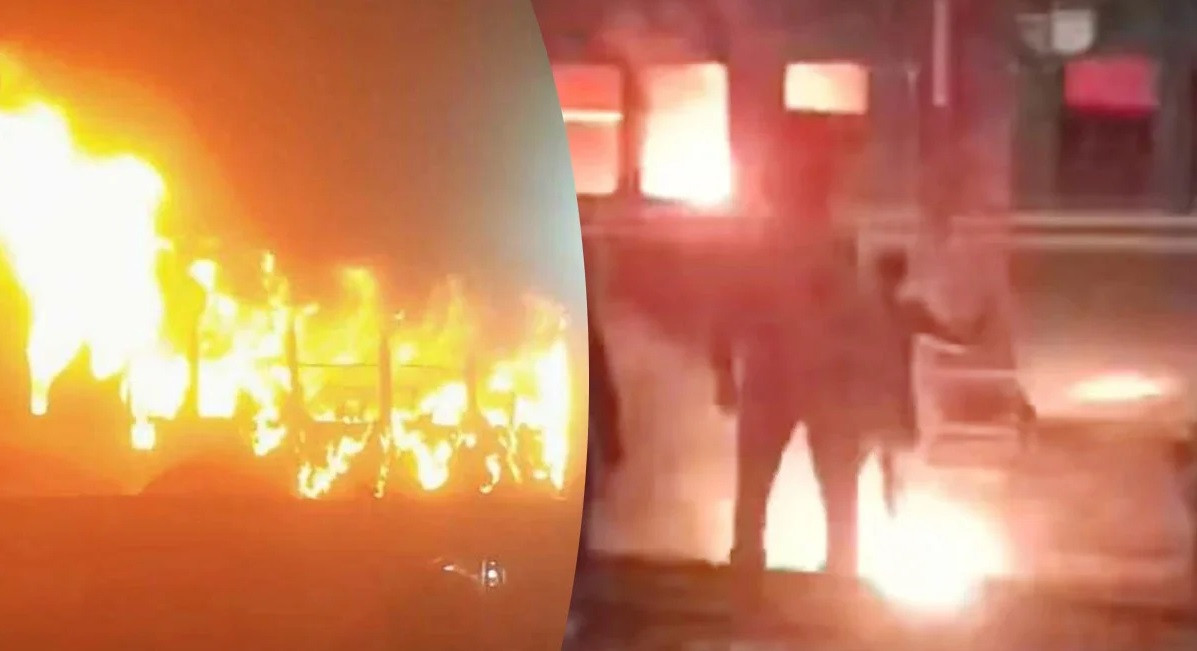
In the picture, a bus caught fire in Dholaipar and an abandoned train compartment caught fire in Tejgaon.
Arson attacks on vehicles and establishments, along with crude bomb explosions, have continued in different parts of the country for more than a week.
Multiple vehicles were set ablaze again yesterday. Over the past four days alone, around 32 vehicles and establishments have been torched, keeping the public gripped by fear and uncertainty.
People travelling by public transport and commuting to workplaces or educational institutions are experiencing growing anxiety, as the situation remains volatile.
Yesterday, 12 platoons of Border Guard Bangladesh (BGB) were deployed in Dhaka and surrounding districts to maintain law and order and ensure public safety.
The International Crimes Tribunal-1 is scheduled to deliver the verdict on Monday in the case against ousted former prime minister Sheikh Hasina and two others for crimes against humanity allegedly committed during the July mass uprising. The date was announced on Thursday. The other accused are former home minister Asaduzzaman Khan Kamal and former Inspector General of Police Chowdhury Abdullah Al-Mamun, the latter being considered a state witness.
A Reuters report yesterday said tensions in Dhaka have escalated ahead of Monday’s verdict against Sheikh Hasina, with attacks in the capital rising alarmingly. According to the report, over 400 BGB personnel have been deployed across the city, security checkpoints have been intensified, and strict restrictions placed on public gatherings.
The Reuters report also noted that on 12 November alone, law enforcement recorded 32 crude bomb explosions, along with arson attacks on buses in Dhaka and several other districts. Police have recently arrested several activists linked to the Awami League on allegations of involvement in bomb attacks and sabotage. A branch of Grameen Bank—founded by Chief Adviser Dr Muhammad Yunus—was also attacked, and a train carriage was set on fire at Dhaka Railway Station.
Speculation continues to grow surrounding the verdict. Media outlets in neighbouring countries and social media platforms have seen widespread commentary. On Thursday, calls for “lockdown” programmes circulated online, with “shutdowns” reportedly being planned for Sunday and Monday.
In a national address on Thursday, Chief Adviser Professor Dr Muhammad Yunus outlined the implementation of the July National Charter. The government later published the gazette of the July National Charter Implementation Order 2025. He stated that the national election and referendum would be held on the same day. A bicameral parliament will be formed, with a 100-member upper house constituted based on proportional representation, and constitutional amendments would require approval from the upper house.
Following the address, the BNP officially thanked the government and urged both the government and the Election Commission to prepare for a referendum and national elections in early February. Jamaat-e-Islami, meanwhile, alleged “bias” within the current interim administration. Jamaat, along with seven allied parties, is continuing its programmes under a five-point set of demands.
On Thursday, the public endured a day of fear amid the banned Awami League’s “Dhaka lockdown” programme. Buses, highways, rail routes, and various establishments came under arson attacks, while felled trees were used to block major roads and railway lines, severely disrupting transport services nationwide. Many passengers avoided travel altogether. Long-distance bus services operated at minimal levels across nearly 300 routes due to the lack of passengers.
In Faridpur’s Bhanga upazila, protesters blocked highways at five points by burning tyres and tree trunks. Leaders and activists of the banned Awami League and its affiliates gathered on the roads carrying sticks, machetes, shields, and other weapons, disrupting transport in 21 districts of the southern region and causing severe congestion near the Padma Bridge. Reports of blockades and protests emerged from several other districts as well.
Many schools in Dhaka remained unofficially closed, especially as school buses did not operate. Numerous parents kept their children at home out of fear. Several institutions shifted to online classes for the day.
Yesterday, miscreants set fire to railway tracks in Brahmanbaria. A pickup van was torched in Ashulia. In Manikganj, a sleeping bus driver suffered burns after arsonists set his vehicle ablaze. Memorials of the July uprising were set on fire in Patuakhali and Barguna, while a bus was torched in Barguna and another in Dhaka’s Mirpur.
According to analysts, the Awami League may attempt to incite unrest ahead of the verdict against Sheikh Hasina, which has naturally alarmed the public. Parents are particularly anxious about sending children to school, and commuters remain cautious. Many fear the situation may worsen on Sunday and Monday, potentially affecting offices, factories, and educational institutions. There is widespread concern about whether fresh instability may unfold.
At an event on Thursday, BNP Senior Joint Secretary General Ruhul Kabir Rizvi said, “We are again witnessing proof that the culture of arson attacks belongs to the Awami League. When they were in power, they blamed the opposition, but now the evidence is showing who is actually setting buses on fire.”
He added, “Those who looted public wealth and built their own palaces while in power have no compassion for people. They cannot forget the luxuries they enjoyed under Sheikh Hasina’s rule. That is why they are resorting to underground terrorist tactics and attacking people. The last few days have shown clear examples.”
At another event yesterday, BNP Chairperson’s adviser Habibur Rahman Habib said, “It seems to me that those who do not want elections may be involved in the Awami League’s lockdown and arson attacks. Ahead of the verdict, if the Awami League announces any programme, certain quarters inside the country may join them to create fresh turmoil.”

